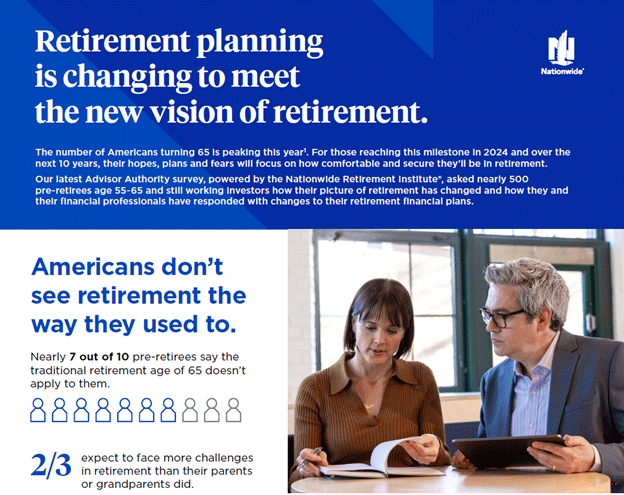04/15/2024 — There’s an idealized picture of what retirement should look like—leisurely days of boating or walking on the beach, plenty of time to enjoy the finer things in life. It’s not like that for all retirees, of course. Many face day-to-day challenges of making ends meet and staying physically and socially active.
For many current workers, that dream of retirement seems further away than it was for older generations at the same age. That’s because economic challenges and uncertainty in financial markets are making it harder for many people to realize their retirement dreams.
This year marks a demographic peak with more Americans turning 65 than ever before1. And in the years to come, this wave of people reaching the traditional retirement age will remain high. Many of these pre-retirees see retirement differently than earlier generations. A recent Advisory Authority survey, powered by the Nationwide Retirement Institute®, found that 69% of pre-retiree investors (ages 55-56) think the standard retirement age of 65 doesn’t apply to them.
Retirement isn’t what it used to be
The pressures that pre-retirees are facing now are already altering the idealized picture of retirement—and not necessarily in a positive way. Two-thirds of pre-retirees in our survey (67%) believe they’ll face more challenges during retirement than their parents or grandparents did.
To me, this represents a shift in how we approach retirement as investors and as financial professionals. We’re in what feels like uncharted territory, especially for those who are just a few years away from transitioning out of their careers.
Some eye-opening results from our survey show how impactful economic concerns are among pre-retiree investors. More than half (57%) said inflation poses the biggest challenge to their retirement plans in the next 12 months. Moreover, 42% agreed that managing day-to-day expenses is getting more difficult due to the rising cost of living.

View the infographic
Shifting behaviors and outlooks
These economic pressures are forcing pre-retiree investors to change their behaviors and outlooks. For example, twice as many pre-retirees say their plans have changed over the last 12 months to delaying retirement (22%) compared to retiring early (11%). And nearly four in ten pre-retirees (41%) said they’d continue to work in some capacity in order to supplement their retirement income out of necessity if they retired in the next 12 months.
Spending habits also appear to be shifting. More than one-quarter of pre-retirees surveyed said they would live frugally in order to fund their retirement plans if they retired in the next 12 months. Many are following through on this intention; 41% of pre-retirees said they have scaled back unnecessary spending such as taking vacations, buying jewelry and going on shopping sprees in order to free up money they can save toward retirement.
Lack of confidence in Social Security is also shaping how pre-retirees are planning for retirement. For older generations, Social Security was the bedrock for financial security throughout retirement. But for many pre-retirees, uncertainty about the future of the program is a significant factor in rethinking or redefining their retirement planning strategies.
While Social Security has been an important source of retirement income for older generations, 43% of pre-retiree investors said they’re not counting on Social Security benefits as much as previously expected, with 27% planning to receive less in Social Security benefits than previously anticipated.
Finding value in professional guidance
Even as economic concerns cloud the outlook for many pre-retirees, our survey revealed some hopeful signs that financial professionals can use to build on for their clients’ financial future.
First, the pessimistic view of the economy may be changing. In our survey, more pre-retirees described the financial outlook as positive (36%) rather than negative (32%). And nearly half of pre-retiree investors see lower interest rates coming in the next 12 months.
Second, and perhaps more importantly, pre-retirees see value in the relationships they have with financial professionals and want to work more closely with them to help improve their retirement preparedness. For example, 70% of pre-retiree investors feel their financial professional understands their needs, compared to 62% of all investors.
The topics pre-retiree investors frequently discuss with financial professionals directly address their most pressing concerns. These topics include:
- Accumulating sufficient savings to enter or stay in retirement (49%)
- Tax planning strategies (38%)
- Converting accumulated savings into retirement income (33%)
Market fluctuations and prolonged economic uncertainty underscore the importance of a holistic financial plan that encompasses short and long-term goals. Nearly half of surveyed advisors (44%) said they take a holistic approach to retirement planning with their clients. The guidance that financial professionals often impart to their clients covers a wide range of planning needs, including:
- Protection against market risk (43%)
- Outliving their savings (42%)
- Claiming Social Security benefits (28%)
- Planning for health care costs in retirement (21%)
A critical time for sound financial planning
The years just before retirement are critical for clients. This is a time when they’ll face decisions that can have implications for the rest of their lives. Financial professionals play important roles in helping pre-retirees plan holistically for factors such as Social Security, health care, long-term care, taxes and income in retirement.
Good financial professionals can identify gaps in their clients’ financial picture and address their most pressing needs with a financial plan that’s built for resilience. A few bumps in the road shouldn’t lead clients off the path to their retirement dreams.
A secure and comfortable retirement is not impossible to achieve – even for those who are feeling pessimistic about their current outlook. Financial professionals are ideally positioned to help clients craft a financial plan for the future that can endure through different market and economic cycles.


